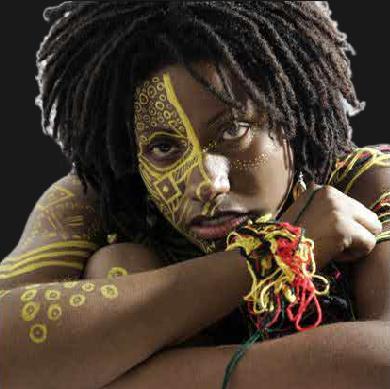AfroPeruvian Youth

Find Their Power
While Brazil was the largest recipient of slaves during the Transatlantic Slave Trade, African slaves were sent all over Latin America. In Peru, people of African descent currently account for roughly 10% of the population and face a number of economic, health and education issues that continue to keep them on the margins of Peruvian society.

The transatlantic slave trade brought Africans to North and South America.
Founded in 2001, Centro de Estudios y Promocion Afro-Peruano (Center for the Study and Promotion of AfroPeruvians), also known as LUNDÚ, promotes and develops grassroots organizing among AfroPeruvian communities through artistic and cultural projects to create change. Leading these efforts is Monica Carrillo, a poet, activist and organizer who saw the need to undo racism, beginning with youth. LUNDÚ is the only feminist, youth founded and led organization in Peru, addressing issues ranging from sexual and reproductive health to education through the mediums of publications, documentary films and grassroots organizing.
LUNDÚ has a number of projects going on. Most notably, their Inclusive, Anti-Racist Education Program focuses on improving the quality of life for AfroPeruvian youth by creating equitable conditions for access to primary, secondary and higher education – especially in rural communities. They do this by providing a scholarships for participants. Their Network of AfroPeruvian Youth is composed of 20 youth leaders from the El Carmen district. They work promote human rights, sexual health, reproductive rights. They publish the blog Estética en Negro or Black Aesthetics. The blog works to strengthen the identity and self-esteem of children of color and help them develop the skills they need to combat racism, violence and exclusion. Their program Advisory Center operates as a reference for organizers to develop advocacy skills through trainings focused on community organizing, sensitization and facilitating dialogue about sexual and reproductive rights. The overall aim of LUNDÚ is to give AfroPeruvian children and girls, both from rural and urban areas, the chance to overcome obstacles through an awareness of ethnicity and gender.
LUNDÚ is an important organization because Latinos both within and outside of Latin America are generally imagined as being outside the Diaspora. Racism towards Black Latinos is commonplace alongside a denial of their African roots. From the outside, most people only imagine Latinos as people who look like Ricky Ricardo or Sofia Vergara, which constantly leave AfroLatinos out of the picture. The work that LUNDÚ does helps engage the ethnic reality thousands of people in the Diaspora experience on a daily basis.
__________________________
 http://www.oruperu.com/" />
http://www.oruperu.com/" />
MONICA CARILLO, an Afro-Peruvian Hip-Hop activist, writer, poet, singer, musician, community leader, journalist, human rights advocate, feminist and educator, working to empower her community, especially working with younger generations of Peruvian young people that live under poverty. Carrillo, who goes by the name Oru, creates music that mixes poetry, afro-beat, soul, hip-hop and Afro Peruvian music to illuminate the contributions made by those of African descent living in Peru, to bring attention to the ongoing effects of racism and sexism and as a form of self expression. Her music has been featured throughout the globe, most notably on MTV Europe. Concerned about the effect of racial and sexist discrimination on other young Afro-Peruvian women, Carrillo founded LUNDU, the Center for Afro Peruvian Studies and Advancement, an anti-sexism, anti-racism, anti-homophobia organization focused on empowering a new generation of Afro-Peruvian leaders. It is currently the only group working on issues of gender, sexuality and human rights in Afro-descendent communities in Peru. Carillo was recently attacked for her anti-racism campaign that demanded that a “black mammy” character be removed from a television show. She has given speeches and conferences in the US, South Africa, England, Brazil, Colombia trying to call the attention to the problems of her communities. Carillo is the recipient of the “Young women that fight for the future” award by the NYC-based advocate organization MADRE.
__________________________
Empowering
Perú's Black Communities
 Monica “Oru” Carrillo
Monica “Oru” CarrilloAs a Peruvian black woman, Monica Carrillo who herself faces racism and sexual discrimination, has become a role model and an advocate working to empower the Afro Peruvian community, particularly the young. She wants Peru’s rich African heritage to be included as part of the Peruvian national identity. Her work with impoverished black youth has given her international recognition.
The name, LUNDU, originates from a traditional African dance in The Kongo region of Western Africa, it means “successor.”
In addition, she is a hip-hop artist, writer, poet, singer, musician, journalist, and educator.Monica, or Oru, as she is called, mixes poetry, Afro-beat, soul, hip-hop and Afro Peruvian music to highlight contributions made by black Peruvians to combat racism and sexism. Her music has been featured internationally, particularly on MTV Europe, addressing how discrimination, sexism effects young black Peruvian women.
“The other day I left my house...and counted the number of insults I received in 20 minutes: 12. People say these things and they don’t run away, because they feel they’re in the right.”
--Monica “Oru” Carrillo
Oru founded LUNDU, the Center for Afro Peruvian Studies and Advancement (see Black Peruvian Rights Struggle), which strives to improve conditions for blacks who represent between seven and 10 percent of Perú's population. She and her organization LUNDU received threats because of their successful campaign to remove a racist television program from the airwaves (see Perú's Racist Propaganda). LUNDU helps young Afro-Peruvians overcome discrimination using the arts, advocacy, education, civic engagement, and economic and educational opportunities. LUNDU’s outreach to black youth involves life skills, sexual education, black pride workshops, and empowerment against violence, abuse, and forced sex, and unwanted pregnancies. Oru has been quoted as saying, our girls believe their lives are worth something.
>via: http://ahorasecreto.blogspot.com/2011/08/afro-peruvian-soul-and-hip-hop-activ...